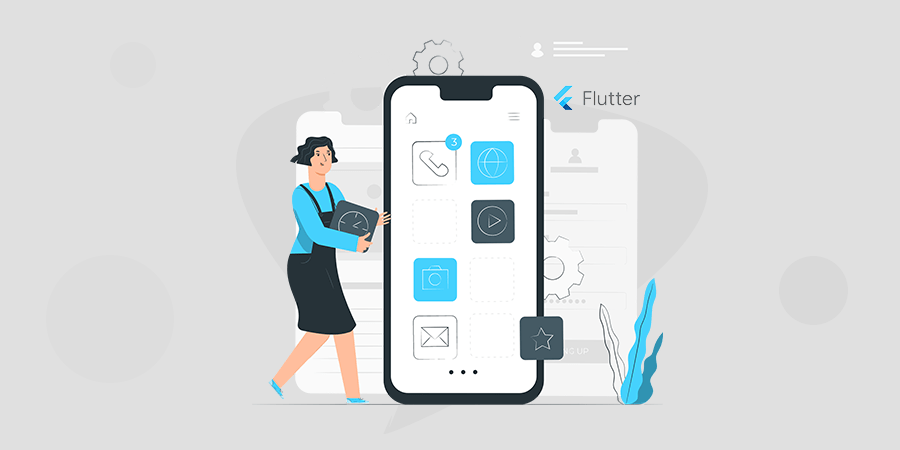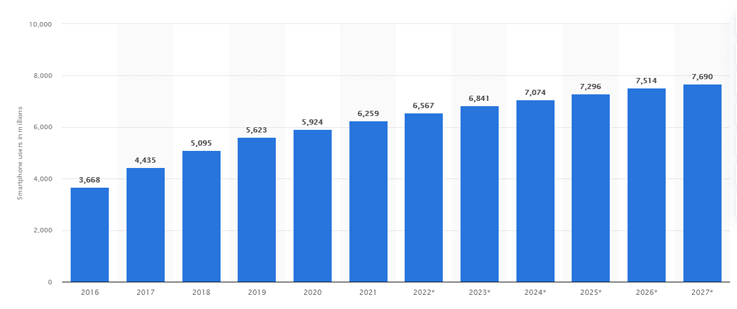
From Idea to Launch: How to Create an AI Dating App ...
Dating apps have changed how people meet and start relationships. Inst...

There is consistently rising interest in downloadable apps from businesses. Consumers are more eager to download new apps. Statista reports state that mobile app revenue reached $318 billion in 2020. This was a 60-billion-dollar increase from 2019 and Statista Digital Market Outlook predicts revenue would rise across most segments to 613 billion U.S. dollars by 2025. Companies naturally want to accommodate their consumers’ demands for more convenience, and some customers may even request apps.
This need sets off a domino effect that improves mobile app development technology. Applications should be more nimble, less expensive, and more flexible, and yet produce top-notch outcomes. As a result, Google created an app for creating mobile apps called Flutter. Flutter’s widespread adoption can be attributed to the fact that it is used as a first-step framework for all app developers.
If you want to reduce the time spent on creating mobile apps, Flutter can help. Developers may now create apps for both Android and iOS using a shared codebase thanks to Flutter. The Flutter community is huge and supportive, and the language itself is straightforward to learn. Given its association with Google, it has quickly become a favorite among app developers. That’s why it’s fair to state that Flutter is a solid foundation upon which to build mobile applications. Let’s take a closer look at Flutter and see how we can create a useful business app with it.
Flutter is a well-known open-source mobile SDK development framework that makes use of the Dart programming language to create applications that have the appearance and behavior of their native counterparts on mobile platforms such as Android and iOS. Flutter was first introduced by Google in 2015, however, the formal debut didn’t occur until December 2018. Since that time, technology has been the source of much consternation in the industry due to the exponential expansion in the number of businesses adopting mobile app development.
Flutter has gained popularity in a few time after its launch and today many reputed mobile apps built with Flutter and doing pretty well on search engines. This framework is popular because it assists in the process of development by making cross-platform applications function in a manner analogous to that of native applications while preserving visual compatibility between various systems.
Some Interesting Facts About Flutter App Development
The survey on small business trends states that only forty percent of new businesses are successful overall. There is not only one but potentially several factors that contribute to the failure of enterprises, but there are also several factors that, if anticipated correctly, would drive businesses to progress. Choosing to invest in the creation of Flutter apps is an example of such a wise move. Apart from being cost-efficient, several other elements make businesses choose this SDK toolkit for app development; here are three significant ones.
Constant latency, unwanted updates, unsynchronized notifications, etc., are the most frustrating things a user might encounter in an app. Since we live in a technology age, entrepreneurs aim to stay ahead of the curve by offering their customers the best solution possible. However, more than just having a novel app idea is required. Managing a defining market can be difficult, but picking the proper developers and technology can make the road to enticing the audience much smoother. Flutter allows startups to develop intuitively better user interfaces, offering a unique mechanism to the user and guaranteeing a positive one.
Flutter is the best option for MVP development. The term “minimum viable product” (MVP) describes just that. Launching your product with only the most basic functionality for testing with a select group of people, typically beta testers is what the term “minimum viable product” refers to.
Now, with the help of Flutter and MVP, programmers may engage in efficient development. With Flutter, MVP is your go-to choice for reliability, swiftness, and adaptability. In addition, Flutter contains many libraries containing various development tools, which lightens the strain on app developers.
Flutter is all about widgets. Since the user interface and user experience are two of the most critical factors in the success of an app, Flutter includes pre-built widgets that make it simple for developers to design unified object models and mold an app to the typical user’s requirements. With the help of the widget’s integration, programmers can go beyond the rudimentary and produce a multipurpose app with widespread appeal.
Let’s take a closer look at a few of the easy that will assist you in creating the best professional mobile application for your business by using Flutter.
Without a well-defined business need, it will be impossible to assemble the right team, generate ideas for potential solutions, or do the necessary cost-benefit analysis. Your business’s pain is the root cause of its need, and it is your responsibility to find relief for that agony. You need to figure out the needs and determine the requirements of your business. Once you have a solid grasp of what features are essential, you can check if the Flutter app features go well with the requirement of your business.
There are undertakings that are motivated by possibilities rather than issues. In order to build an effective app, you should first identify your business’s requirements and then learn how to incorporate flutter’s capabilities into your workflow.
The concept of conducting a cost-benefit analysis is an essential part of developing a mobile app using Flutter. The only method to determine whether or not your app will be lucrative and, feasible for your business is to conduct an in-depth analysis of the costs of developing the app as well as the advantages or outcomes that are anticipated from using the app. Your attention to detail and a strong commitment to customer demands will be lost if you are unable to afford to remain in the business.
However, you do not need to be concerned about the expense of developing a Flutter app because the cost of developing apps using Flutter is quite minimal when compared to the cost of developing apps using other platforms. However, the costs are determined by a number of different elements, and the range of possible prices is quite large. Therefore, before beginning a project, it is best practice to get estimates of the costs involved rather than fixating on a specific sum in your head.
Among the many important steps taken in researching and selecting the right Flutter app development team, is a crucial one. If you want to provide your users with a fantastic mobile experience, choose professional developers who can give your project their full attention and who have expertise in creating Flutter mobile apps. The development team you choose should collaborate with you as a business partner, have knowledge of mobile app monetization , and also offer advice when it counts.
The Flutter development team you choose should have a wealth of experience, and that experience should include familiarity with cutting-edge tools and an understanding of the commercial world. You should look for a team with a wide range of experience, strong analytical and UI/UX designing chops, and a focus on your project when hiring specialized mobile app developers. Furthermore, other considerations include things like credibility, reliability, effort, and loyalty.
Nothing is more important than a top-notch user experience in today’s cutthroat digital market. The success of your digital product hinges on the quality of the user interface and the user experience it provides. When combined with a fantastic user experience (UX), a fantastic UI can leave a lasting impression on users. Consequently, you need to effectively implement both in order for your app to be successful.
Providing a satisfying encounter for customers is essential to the success of your business. You need just focus on making a good user interface and user experience for your app’s users. Statista estimates that there are more than 6.3 billion smartphone users worldwide. According to Statista reports the Google Play Store currently hosts 2.89 million active mobile applications.

Image Source:- Statista
Excellent user experiences are the result of thoughtful user interface and user experience design. Because of this, it’s crucial to the success of any business. Focus more on customer happiness if you want your online store to gain popularity and grow your brand. Moreover, there are several ways in which UI/UX design can help your business such as:
There are a lot of apps on the App Store and Google Play store, so it’s important to mobile market apps. That means you have a lot of competition. To stand out, you need a good plan. This kind of marketing can help you get people excited about your app before it even comes out. You can also use different strategies to make more people aware of your brand and get more customers. Mobile app marketing is like other types of marketing in that you should always think about the funnel. Your audience could be at any point in the funnel, so you need the plan to reach everyone.
There are four steps to marketing a mobile app:
You need to do some pre-launch marketing to get people talking about your app and increase your app’s exposure in the app store, and that’s the awareness phase. You should now have a message framework and brand positioning with a value proposition ready to persuade users why they should download the app.
Prior to the acquisition phase, there is the engagement phase, during which users interact with your brand in preparation for making a purchase or app download. Brands need two-way communication with potential app users to persuade them to download and spend money on the app.
User acquires your product when they install it on their device. But why would they choose your app over others that accomplish the same thing? Understanding your audience better and honing your approach are ongoing tasks that must be addressed during the acquisition phase. Advertising on social media and other online platforms can help increase exposure to your business and ultimately bring in new customers during the acquisition phase.
After a user has installed your app, they must be convinced to keep using it. It’s simple to uninstall an app, so you’ll need to work hard to keep your users. In order to keep users around, it’s smart to prioritize the customer’s overall satisfaction with the app over any short-term gains.
Launching a business app is the next step after putting out a marketing plan. Keep in mind that your customers are always connected to your brand through your app. To meet their high expectations, you must continue to develop your app and expand your business. Even with perfect feature integration prior to release, even the finest mobile apps tend to collapse after they go live. The main causes include not performing regular upgrades and putting off necessary maintenance. When developing a business app, it’s crucial to plan for updates and support after the app has been released. For this reason, it’s clear that developing reliable and cutting-edge mobile app solutions is crucial. If you want your Flutter app to be as successful as possible, you should invest in a dedicated team of Flutter app developers that can improve its performance through consistent upkeep.
Flutter is clearly one of the best options if you want to create a highly scalable app for your company. Many issues with the software development process can be addressed with Flutter as well, where other technologies fall short. Keeping up with the ever-changing needs of modern businesses calls for innovative strategies that can adapt to their evolving needs. Flutter is the best option if you need to build a business app that is both flexible and secure in terms of future expansion. To get started on the development process, you can hire a well-respected Flutter app development company to ensure that you receive top-tier services for your enterprise app.